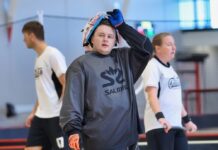In June 2022, Hohou Te Rongo Kahukura – Outing Violence and Rainbow Hub Waikato began researching the best ways to uplift Takatāpui and Rainbow elder voices. The research’s findings were published last month in a report, along with podcasts featuring highlights from community interviews. Lead Researcher Sandra Dickson discusses the gaps in care for our elderly and what we need to do to create truly inclusive rainbow communities.
Rainbow Hub Waikato was moving from being a youth-focused organisation to an all-ages organisation, and we kept hearing that existing rainbow community spaces, advocacy, and training didn’t speak to or for older people.

I started reaching out to older folks in our communities around the country, asking them what they thought and what gaps they saw. I heard so many horrible stories – a bisexual guy who thought he had a place in an aged care facility, but it was gone at the second interview stage when he mentioned his HIV status; a trans woman living quietly in her own home in a rural community with waning physical health, so she needed help, but she was too anxious to try homecare services in case they didn’t know how to treat her with respect, so she was becoming more and more unwell; older lesbians going into retirement villages and being ostracised; the gay guy about to retire, not ‘out’ (even though he runs his own business) with no connections to other queer men; the bisexual woman, who got in touch just days after we sent out invites to our launch, because her wife was in end-of-life care and she wasn’t even being treated as her family; the trans man whose family called him by his old name, misgendered him and pretended he was a different person at his funeral, much to the horror of his friends and chosen family.
Many of these stories have obvious things to be concerned about. Discrimination or fear of discrimination are the lived experiences of growing up in the kind of social conditions our elders have survived. But they were not things we could see getting the focus they needed, and we needed to move beyond anecdotes, which is why we undertook the research.
We wanted to find out what life was like for Takatāpui and Rainbow elders, so we asked about social isolation and connection, including in families, and found that our elders want more opportunities to connect with Takatāpui and Rainbow communities, more groups and events that are relevant to them. We looked at how discrimination stops older people feeling able to reach out – over our lifetimes, but also in the here and now – and how corrosive that is.
Our elders had plenty to say about what they want and need from services and groups for older people – respect for diverse identities, using people’s correct names and titles, recognising partners and chosen family, and stopping crappy stuff from other older people. Many elders talked about generational change but said that they are often pigeonholed with their own generation, who may have changed the least. And ageism inside our communities really isn’t helping either. It keeps our younger folks ignorant of our histories and our older folks isolated and alone.
Then there are these stories of invention, of being proud of how much has changed, of loving being who they are, and of knowing, through lived experience, how to build resilience and survive because they have!
I was really struck by how strongly our focus groups with Takatāpui, Rainbow Pasifika, and ethnic people named the impact of ageism in our communities and saw this as being a direct result of Western values. In the focus groups, people talked so much about needing to know our whakapapa, about wanting to learn from elders and support them, and about how inside Māori, Pasifika, and lots of ethnic communities, elders are highly valued.
The thing that seems to surprise others the most is that more than 1 in 10 people who answered our survey said that they are not out to anyone in their lives.
In most interviews, social isolation came through very strongly for everyone, increasing poor physical, mental, and spiritual health outcomes and raising the risk of elder abuse. To address that, we need to address discrimination. At the moment, there’s nothing about us in government strategies or services for older people. This needs to change – informed by older Takatāpui and Rainbow people. Our services and groups for older people need to be upskilled to be welcoming, safe, and mana-enhancing. For our existing Takatāpui and Rainbow community groups, there’s an invitation to ditch the ageism, learn about our histories – note the plural there, that came through very strongly – and create intergenerational spaces.
Whether you’re an older person or not, read the report, listen to the podcasts, think about how you include, and listen to elders, especially those who are different from you. I know that for me, because my family of origin is pretty rejecting, having connections to queer elders is huge. They are family. This project was an absolute delight. We were super honoured by all the taonga and stories shared with us. We hope they create change in the world.
Key findings from the Uplifting Takatāpui & Rainbow Elder Voices report:
– Culturally specific experiences of Pasifika and ethnic Rainbow peoples must be recognised, rather than a one-size-fits-all approach.
– Existing older persons’ strategies do not adequately include and Rainbow older people.
– Include Takatāpui and Rainbow elders in service planning for older people and elder abuse.
– Include the needs of elders in funding for Takatāpui and Rainbow communities. Older people feel invisible in Takatāpui and Rainbow community groups and activities. A need for intergenerational spaces inside Takatāpui and Rainbow communities that allow connections across age was particularly voiced by Māori, Pasifika, and ethnic people. Funders need to recognise and value projects and activities that move beyond work focused only on young people. This includes funding for training for health, mental health, and social services providers.
- We need specific groups and activities relevant to Takatāpui and Rainbow older people.
– Elders cannot find communities or activities aimed at them – not only from social services but inside Takatāpui and Rainbow communities. This is likely to reflect who is involved in Takatāpui and Rainbow community groups at voluntary, paid, and governance levels and may require groups to actively seek more engagement with elders. How do you communicate with your community? If it is only online, elders say it does not work for them.
- We need social change and advocacy work that doesn’t end at 30.
Follow Hohou Te Rongo Kahukura on Soundcloud to hear the podcasts and read the full report at rainbowhubwaikato.org.nz/elder-voices/






















